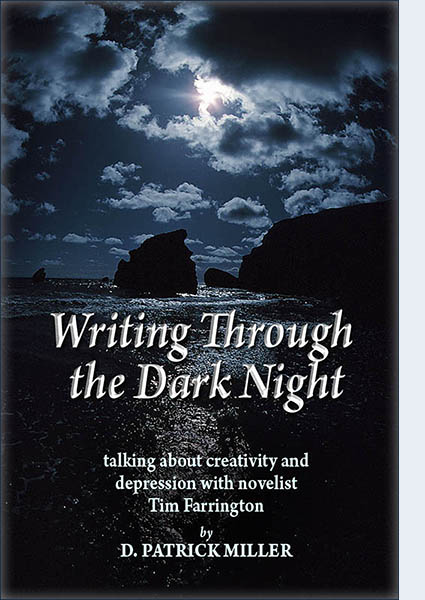
Blake, Lord Byron, Tennyson, Woolf, Poe, Sexton, Plath, Kierkegaard, Pound, Roethke, Hemingway, Tennessee Williams, and David Foster Wallace . . . the ranks of notable writers and other artists who have suffered from depression, too often fatally, seem infinite.
In fact, a 1995 Scientific American article by Kay Redfield Jamison, a psychiatrist and writer who has chronicled her own struggles with depression, summarized a number of studies suggesting that “artists experience up to 18 times the rate of suicide seen in the general population, eight to 10 times the rate of depression and 10 to 20 times the rate of manic-depression and its milder form, cyclothymia.”
These statistics would seem to verify the historic popular association of artistic creativity with madness. But in recent years a countervailing opinion has surfaced among both artists and scientists, particularly in the work of psychiatrist Peter D. Kramer, who argued in his 2005 book Against Depression that this malady has no more to do with creativity than, say, arthritis, and that both are simply painful, pointless diseases that can and should be treated with the most effective medications we can develop and prescribe.
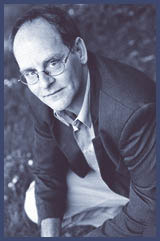 Tim Farrington is an accomplished novelist who adds a spiritual dimension to the discussion of depression and creativity in his short book A Hell of Mercy: A Meditation on Depression and the Dark Night of the Soul. For Farrington, who has been hospitalized for clinical depression, the tension between madness, creativity, and enlightenment began early: “I spent my senior year of high school in Honolulu listening to the darker songs of the early Elton John, cutting calculus class to read D.T. Suzuki, slipping away to the Buddhist temple halfway up the Pali, and in general letting the warp and woof of my tidy American future unravel.” He remembers that his first significant bout of depression was not incapacitating, and raised a significant philosophical quandary:
Tim Farrington is an accomplished novelist who adds a spiritual dimension to the discussion of depression and creativity in his short book A Hell of Mercy: A Meditation on Depression and the Dark Night of the Soul. For Farrington, who has been hospitalized for clinical depression, the tension between madness, creativity, and enlightenment began early: “I spent my senior year of high school in Honolulu listening to the darker songs of the early Elton John, cutting calculus class to read D.T. Suzuki, slipping away to the Buddhist temple halfway up the Pali, and in general letting the warp and woof of my tidy American future unravel.” He remembers that his first significant bout of depression was not incapacitating, and raised a significant philosophical quandary:
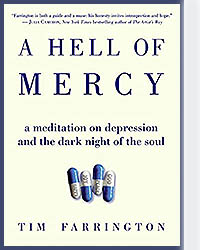 “Was I truly depressed or just awakening to the First Noble Truth of Buddhism, the insight that samsaric life is misery? My melancholy seemed like simple realism; if you weren’t depressed, you obviously didn’t know what was going on. I was becoming conscious of what Gurdjieff called ‘the horror of the situation.’ And so I took long walks and thought about death and the suffering of innocents. I wrote bad poetry. I did not go to Stanford.”
“Was I truly depressed or just awakening to the First Noble Truth of Buddhism, the insight that samsaric life is misery? My melancholy seemed like simple realism; if you weren’t depressed, you obviously didn’t know what was going on. I was becoming conscious of what Gurdjieff called ‘the horror of the situation.’ And so I took long walks and thought about death and the suffering of innocents. I wrote bad poetry. I did not go to Stanford.”
Instead, Farrington went into and out of a couple of other universities while pursuing his own independent study of Western philosophy, “living on cornflakes and macaroni and cheese” and briefly considering the possibility that he was an extra-terrestrial whose diurnal cycle just didn’t sync with the Earth’s 24-hour rotation. Eventually he got deep into Buddhist and New Age philosophies, lived ascetically in an ashram and later in an urban commune which posted a sleeping schedule to help everyone keep up with the rotation of sexual partners. He married and divorced, cleaned houses in San Francisco while writing several novel manuscripts that he threw away, and eventually moved to Virginia Beach to teach Sunday school for a while and focus on his growing body of work.
I like to say that I “discovered” Tim Farrington when I read an early short story of his in THE SUN and recommended it to a literary agent. His first published novel, The California Book of the Dead, was a charming and humorous portrait of West Coast New Age culture, and was followed by the popular philosophical romances The Monk Downstairs and The Monk Upstairs. He ventured into mystery writing under the pseudonym Frank Devlin, and garnered critical acclaim for Lizzie’s War, the story of a Vietnam-era wife and mother that draws deeply on Farrington’s own background as the child of a military father. Like so many of us in the word biz, he has lately taken to publishing independently.
In his fiction as well as the essay A Hell of Mercy, one is most likely to be struck not by a mournful outlook, but by writing that’s often so damn funny you’d never guess the author had spent a fair amount of time looking for himself and some kind of ultimate meaning down there in the depths of the human condition. Indeed, Farrington claims that he is “by no means an expert” on depression. “I’m more like a veteran, I suppose: a guy whose ass has been on the line, just one more guy with some stories from the front, someone who kept his head down as best he could and did what he had to when the shit hit the fan.” Nonetheless, as he reveals in the following candid conversation, Farrington is both erudite and refreshingly plain-spoken about the thorny paradoxes that invariably crop up in the discussion of creativity, madness, and the soul.
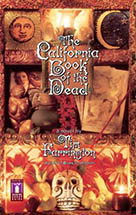 You’ve struggled most of your life with depression. How would you define it?
You’ve struggled most of your life with depression. How would you define it?
FARRINGTON: Dryness, emptiness, hopelessness, helplessness, pointlessness. A loss of the juice of life, a loss of the energy to engage life, and a loss of any joy or pleasure in that engagement. In deep depression, it seems useless, and even painful, to lift a finger. It is a catch-22 state: we are aware of our incapacitation, and aware that we are making our life worse through neglect and inertia, but any effort seems pointless at best. The American Psychological Association manual lists nine diagnostic criteria for a major depression, at least five of which must be present during the same two-week period, representing “a change from previous functioning.”
These range from “depressed mood, most of the day, nearly every day” through anhedonia to fatigue, feelings of worthlessness, and suicidal ideation. I think everyone has a basic intuitive recognition of depression as a morbid state that’s beyond life’s usual downs. The main feature of depression for me, the thing that distinguishes it from other low moods like sadness and grief, is the sense of hopelessness -- that this is it, there’s nothing I can do to change this misery or get out of it. There is hope in purgatory; we can suffer and believe it has meaning in a larger movement of life and soul. In depression, hope seems gone forever, and the suffering seems pointless.
Would you compare depression to a fever, that is, a symptom indicating something is wrong, but not what it is exactly?
FARRINGTON: That’s not a bad metaphor. There is a huge range of causes for fevers, all of them indicating some underlying condition, so it’s often impossible to immediately figure out what’s causing a fever. The fever itself is part of the body’s attempt to heal itself, by mobilizing the immune system and creating an internal environment that’s too hot for many infectious elements. Left to run its natural course, a fever will sometimes correct the initial problem. But of course a fever can prove fatal, too. The parallels with depression are easy to draw: you may experience the occasional moderate depression that serves as a wake-up call to change something in your life. Or the depression may pass without you ever understanding where it came from.
More intense and prolonged depressions, like high fevers, demand more urgent attention and are progressively more incapacitating. It becomes much more important to address the underlying condition or, failing that, to bring the psychic temperature down. And this is when you have to decide whether to let the fever run its course, in the hope that it will accomplish its original effort at healing, or take medication which might help you “cool down” and function normally. Just as too high a fever can actually cause brain damage, recent studies seem to be showing that prolonged depression may also have long-term effects on the brain’s physical structure and chemistry.
When I lived in an ashram, we used to talk about “burning” as a state in which our inner crap was burned up in the fire of the spirit. If you know what you’re doing, that’s one way to go, but it can be risky.
Many spiritual practices talk of overcoming the ego or surrendering to God. Is there a point where surrender or the shrinking of the ego brings on the symptoms of depression? Is a depressive state a necessary stage in the spiritual path?
FARRINGTON: Dealing with the ego is central to any spiritual practice, but so many of the practices we undertake to overcome, shrink, extinguish, or otherwise move beyond the ego are too easily co-opted by the ego. We can end up feeling holier-than-thou pretty quickly. On the other hand, we can also become more capable of recognizing subtle ego agendas as we deepen our spiritual practice. You could see it all as a kind of spiritual arms race: for every soulful insight that frees us of the ego’s control, there is an answering psychic intrigue by which the ego finds a new way to co-opt each bit of awakening and steer it back toward the same old self-serving patterns.
The crisis comes when we begin to realize that all our spiritual efforts are suffused with ego, and that there is no way out of that bind. The classic Zen koan is one of the most obvious techniques to precipitate this crisis; a koan is a question for which there is no ego-answer. When the ego finds itself stymied, it tries all of its tricks and strategems, and when they all fail, then the structure of the ego itself begins to fail in various ways. This bafflement is akin to the creative crisis of unknowing, and the same dangers come into play. Confronted with the loss of certainty and a terrifying experience of helplessness, we are teetering over depression, and it doesn‘t take much to fall in. I wouldn’t go so far as to say that depression is a necessary stage in the spiritual path, but it seems to me that the path always travels through a territory where there is a high likelihood that our mental instabilities are going to be exacerbated, according to our particular natures. And that ain’t gonna be pretty.
I honestly don’t know if it is possible to avoid depression as we move into the cloud of unknowing and learn to live on new terms there. I do know that it is possible, eventually, to live in genuine surrender, with faith, humility, and a realistic trust in the divine, without depression. But for me that is a fruit of a long, intricate process that cannot be hurried or manipulated. Given the psychic stakes, and basic human feebleness, that process will always be risky and prone to disruption and despair. Jesus prayed hard to have the cup of his suffering taken away, before he surrendered to it; he fell three times on the way up the hill, and felt a sense of abandonment on the cross. It took him three days to get out of the tomb, too. Of course, he was faster than most of us.
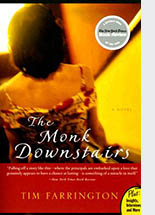 What you’re calling a cloud of unknowing can also be called the “dark night of the soul.” But that phrase is sometimes used so casually that it’s difficult to take seriously. What does it actually mean, especially as it was originally defined by St. John of the Cross?
What you’re calling a cloud of unknowing can also be called the “dark night of the soul.” But that phrase is sometimes used so casually that it’s difficult to take seriously. What does it actually mean, especially as it was originally defined by St. John of the Cross?
FARRINGTON: John of the Cross was a Carmelite monk in the 16th century who wrote a couple of books. One thing to remember is that these books were written for nuns and monks, mostly nuns, of the Carmelite order. He was a partner in the Carmelite reform movement with Teresa of Avila, who was the powerhouse behind the nunneries and monasteries he was involved with. So his books were really written for committed monastics. Most of us are not getting up at 4am to begin chanting the liturgy of the hours throughout the day; we’re not in the classic monastic context of work, prayer, and worship. So John is assuming a certain kind of enclosure that’s far from our ordinary lives when he writes about the dark night of the soul.
That said, his two main books on the subject are The Ascent of Mt. Carmel and The Dark Night of the Soul. In talking about John’s definition, the first thing is to realize is that the dark night of the soul is not something that happens for spiritual beginners. He is fairly indulgent about beginners, allowing for a spiritual honeymoon. There is a period in the spiritual life where you have glimpsed a goal, and have focused your life more or less on pursuit of that goal. So there is a period of feeling like you’re improving, that it’s all getting better, and that with enough hard work you will achieve enlightenment, or union with God, which is the vocabulary within the Carmelite context.
John breaks down the dark night of the soul into the “dark night of the senses” and the “dark night of the spirit.” The dark night of the senses hits you at the point where you have milked your initial enthusiasm for all it’s worth, and you’re starting to realize that your inner life is going to take a lot more work than you may have suspected. At this point you realize that you’re going to have to renounce certain ways of thinking and doing. The dark night of the senses is about living with the dryness of that, living without the traditional pleasures. One thing that makes reading John of the Cross difficult is that he’s assuming a level of austerity that’s daunting to any contemporary ear; it sounds morbid and anti-life.
But if you’ve ever wrestled with the issues of distraction, the way we squander our energies on meaningless pursuits, then you can comprehend what he’s talking about: How do you get your mind to stop running after the things we usually want, and come home to what actually serves our ultimate happiness?
Do you mean that the dark night of the senses is the result of a voluntary abstention from the sensual pleasures of an ordinary life? In other words, it’s not like a depression that comes on you, but a deliberate confrontation with that dryness you’re speaking of.
FARRINGTON: John’s idea of both nights is that when you have carried your own efforts as far as you can, God graces you with the experience of “night.” In short, it’s God’s way of freeing us of our own efforts. It’s a liberation, but that doesn’t mean it’s fun. It’s purgative, in the same sense of a fast. During the first couple days of fasting, for instance, toxins will start surfacing and you may feel miserable. But if you get through that without grabbing a hamburger, and adhere to the discipline, then there comes a point where you are purged and you get the benefits of clarity and lightness. John is talking about a similar purgative process in both kinds of night.
Is the dark night of the senses an initial phase and the dark night of the spirit more intense?
FARRINGTON: In the classic reading, it is. Spiritual aspirants always love their phases: purgative, illuminative, unitive, and so on. It would be nice if things were really so orderly, but the fact is that the process doesn’t sort out that way in actual experience. Similarly, the eightfold path of Buddhism is not really sequential but simultaneous. I’ve never found it really helpful or illuminating to discriminate between these levels of experience. I think the essence of the dark night is that we’re no longer able to get juice, or joy, or fulfillment from God, as we have conceived of God, with the efforts that we have previously found effective. When John says it’s a gift, what he means is that we can never know God through our own efforts. It’s only when our own efforts max out and prove empty that we can possibly be open to the actual grace that God can communicate to us.
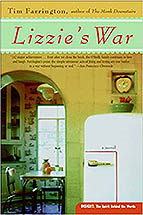 And how is the dark night of the spirit different?
And how is the dark night of the spirit different?
FARRINGTON: This goes back to the medieval way of breaking down the experience to body, ideas, and spirit -- or physical, mental, and spiritual. So the dark night of the senses has to do with the purgation of the body; the dark night of the spirit has to do with the illumination of intellect and the spirit. Basically, what happens is that your ideas crap out. You’ve had all these ideas of God, and you thought you were achieving something. In the dark night, you can no longer achieve anything. You thought you were a spiritual success story, and all of a sudden the story is ringing false and the successes don’t seem like successes anymore.
But this has to be understood in the context of a pretty severe discipline, something that most of us don’t adhere to in the course of daily life. So the popular understanding of a “dark night of the soul” isn’t really the same thing; we may just be feeling really low and looking for the dawn to arrive as soon as possible.
FARRINGTON: Actually, I think the concept has validity in contemporary spirituality. I know for me it’s been a crucial thread through different challenges of my life. Once the fever for meaning has begun to burn in you, it builds at its own pace. I’ve lived in a monastery; I know how much slack there is, even there. There are times in life when the pressure or heat of life gets turned up, and there are greater demands made of us. That can happen inside or outside a monastery. Often the point of living in a cloistered environment is to crank things up, so to speak.
In the ashram where I lived, we used to have special weekends where we would chant all night; I was in a Zen center where we would sometimes meditate for thirteen hours a day. Those are ways of cranking things up, but ordinary life will do that for you too. Perhaps we’ve lost a sense of total spiritual commitment and discipline. But if you read Thomas Merton’s journals, you’ll see that he had issues with the slackness of monastic practice. Regardless of all that, intensity finds us when we’re ready for it; what kind of spiritual environment we’re in is not really the issue.
Maybe we end up in “dark nights” because no one can have enough discipline to progress spiritually in a smooth, steady way toward enlightenment. Or maybe that kind of progress is an ego ideal in the first place. We get hooked on the idea of practicing perfectly so that we can grow in a step-by-step fashion, when genuine spiritual growth actually demands sloppiness: over-indulging, then getting too ascetic, then falling apart, and so on.
FARRINGTON: John’s point would definitely be that even if we try to embrace that ego ideal of constant, steady spiritual growth, it is in the nature of the path for us to hit a limit in terms of what we can accomplish. It’s not because of something we do or fail to do; it’s in the nature of the process. There is only so far that humans can go by their own effort, in the relationship to God. When your own efforts have either shown themselves as empty, or as not enough, then it’s that point at which the dark night begins... when you are faced with the inherent inadequacy of your own efforts.
What are the similarities and differences between following a spiritual discipline and being a writer?
FARRINGTON: For me, they amount to nearly the same thing. Writing and spiritual practice both involve a disciplined, committed, and protracted effort to bring ourselves into line with a more comprehensive reality that transcends normal ego functioning. Both are processes that rely on a kind of grace, the gift of a higher quality of order that emerges from a whole-hearted engagement with truth. And in both cases, I think, it is “by their fruits ye shall know them.” A spiritual discipline worth its salt should lead to a more loving, compassionate, realistic engagement with the world; an authentic writing practice leads you to deeper, more humanly resonant stories and insights.
I have found in the practice of a spiritual discipline that there are times when it necessarily trumps the writing process; that is, there are periods of deeper undoing when the energy empties into silence, way beyond words, for a protracted time. That invariably unnerves me as a writer bent on production, though over time I have learned to deal with my terror a little better. I’ve had to learn to trust those deeper plunges into quiet and stillness. They usually end up being fruitful in the long run, if I can keep from panicking. For me, there’s not really a choice between writing and spiritual practice. If my soul life seems to screw up or knock out my writing sometimes, I’ve never found anything to do about that but accept it. Faith gets me through times of not writing way better than writing could ever get me through times of no faith.
What are the arguments for treating depression in the case of an artist or spiritual seeker who might feel the depression is necessary to their process? And what are the arguments for not treating it?
FARRINGTON: Beyond a certain point, I think it is impossible to argue with someone who feels that depression is necessary to their artistic or spiritual process. Rilke was afraid that if he got rid of his demons, he would lose his angels as well; for creative people, art is the only thread through the labyrinth of the world, and if they think submitting to treatment for their mental illness will break that thread, they are going to resist it. I felt that way myself for decades, terrified of somehow anesthetizing myself to reality rather than facing it creatively, and willing to accept mental illness as the price of that path. Often it takes a genuine bottoming-out to open a person up to trying an explicit treatment for depression. In my case it took that, and also the inspiring example of a painter friend who been in similar depressive straits. She tried an antidepressant and sang its praises, and could testify that it hadn’t cut her off from her emotional and creative depths. Given her example, I tried therapy and medication, and it was a revelation.
The danger of clinging to our demons to save our angels is that our demons may well take over. One of the most powerful feelings I had as the antidepressant medication took effect was a sense of awe at the return of feeling my true, actual self, which had been submerged for a long time. The simplicity and potency of that rediscovered sense of self was extraordinary. In that sense, I have a testimony to offer to others, that seeking treatment for mental illness need not be a betrayal of one’s spiritual or artistic vocation.
That said, there is an emerging school of thought that is perhaps too eager to treat depression instantly and aggressively with medication, and to make an emergency out of depression in every case. There are worse things than suffering through some mental illness until you find your own best way to treatment. The integrity of an individual soul is important, and sometimes our resistance to treatment is a statement of resistance to the social myth of “normality.” For most people, seeking treatment may help immensely, but I would recommend going gently in trying to sell that point of view to anyone resisting treatment for their own reasons, however complex or tangled.
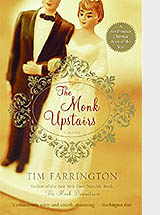 I’ve always been fascinated by Marie-Louise von Franz’s idea of creative depression: that the point of depression is to push the ego down so far that something else, a divine creativity or spiritual energy, can come in over the top. In other words, for the creative person, a depression can open the door to something new because it’s getting the ego out of the way. Does this bear any relationship to John’s idea of the dark night of the soul as a gift?
I’ve always been fascinated by Marie-Louise von Franz’s idea of creative depression: that the point of depression is to push the ego down so far that something else, a divine creativity or spiritual energy, can come in over the top. In other words, for the creative person, a depression can open the door to something new because it’s getting the ego out of the way. Does this bear any relationship to John’s idea of the dark night of the soul as a gift?
FARRINGTON: For John, the supreme reality or center of the human being is God. So if you go deep enough, which means going through the unknowing of the dark night, then you will find union with the God within you. This was an heretical idea, by the way; John had to be careful about not getting himself killed by talking this way, as did Meister Eckhart. Margeurite Porete, author of The Mirror of Simple Souls, did get herself killed for saying that the soul is indistinguishable from God. Both she and Meister Eckhart talked about emptiness as the essence of God; Eckhart said “I pray to God to take me beyond ‘God.’” And they were both talking about silence, the desert of the soul, the experience of nothingness. Porete was exuberant about it, celebrating a lover’s relationship with her own nothingness.
But the early 1300s was a bad time to be doing that. This was the beginning of the Beguine movement, kind of a freelance, non-monastic, communal feminine spirituality, and basically the church authorities of the time wanted to make an example of her. This was a time of tremendous ferment; Meister Eckhart was struggling to stay within the bounds of orthodoxy himself. He survived and his reputation as a mystic was somewhat rehabilitated, but Porete was burned at the stake in Paris.
Talking about “union with God” has been a matter of life and death, not just semantics, throughout the history of religion. John of the Cross was careful not to make trouble in this way, although he was jailed and beat up, less for his theology than for his participation in the Carmelite Reformation. The actual poem “The Dark Night of the Soul” was written in prison; the later book is an exegesis of the six stanzas of that poem. Thus, even his story illustrates a connection between the dark night and creativity. My own vocation as a writer has certainly been tested by dark nights. Even at times when I felt like a writer with nothing to write, the idea of being a writer was still a thread through the labyrinth of darkness.
At any point did John imply that one can get through the dark night without feeling bad? In other words, if we are truly surrendered to the recognition of our own emptiness, and the inadequacy of our own efforts to reach God, can we sit still in the darkness and not be depressed about it? Is it not so bad if we’re not resisting the process?
FARRINGTON: That’s like asking if it’s possible to fast without experiencing the unpleasantness of purging the body of toxins. Well yes, theoretically, if you’ve had a perfectly pure diet your entire life so that there are no toxins to purge. To say that we suffer through the dark night just because of our resistance is true enough, but resistance is our nature. It is true that you can reach a point in your practice where what you would have formerly thought of as depression actually feels blissful. That can definitely happen, and it does have to do with surrender.
To me that sounds similar to the stage of grief or sorrow that has a kind of sweetness to it, when you’re past the experience of desolation and loss and have moved into acceptance.
FARRINGTON: Which comes right after depression, in the stages of Kubler-Ross. Right down to the neuronal level, we’re talking about a form of learning, finding new paths for movement of your energy and getting free of old patterns. But it’s also a kind of knowledge, recognizing just what you can and can’t do as a human being. Possibly the heart of our humanity is to want something we cannot achieve by our own efforts. The surrender required for experiencing the fruitfulness of the dark night is a way of living with longing. It’s a kind of waiting which is completed by waiting -- and yet you are still waiting for something.
Are there other useful comparisons between the stages of grief and the phases of the dark night?
FARRINGTON: The dark night begins when we realize that all our spiritual efforts have been subtly building up our egos, and that our cherished notions of God are essentially false idols. Then we lose both our sense of self and of any reliable God, and this is where Kubler-Ross’s stages of the emotional course of grief are relevant. There is an initial denial of the problem, an attempt to go on with business as usual; as that denial is frustrated, a kind of rage kicks in, like Kubler-Ross’ stage of anger. Then comes a passionate attempt to fix things by trying new tricks and techniques, which is comparable to the stage of negotiation, attempting to cut some sort of deal with a reality in order to feel some measure of control.
When all these efforts crap out, we experience what Kubler-Ross calls depression, and what John of the Cross calls darkness, emptiness, unknowing: the self’s undeniable helplessness in facing the loss of its former certainties. The final stage, for both processes, is acceptance, the essentially mysterious grace of the humbled self’s accommodation to an uncoerceable, unmanipulable deeper reality. That’s true surrender.
Does that mean you are waiting to overcome your own resistance, that is, waiting for your nature to change?
FARRINGTON: No, not at all. But I think you are waiting for your nature to stop fighting your nature. It seems to me that most of the misery of the dark night comes from believing that you’re doing something wrong, and should be doing something better. John of the Cross rags on spiritual directors who send aspirants back to complicated forms of prayer, to improve the content of their prayers, rather than accepting that the dark night is a time of achieving nothing. You have to let go of your own need to accomplish something.
So that’s one torment of the dark night, the conviction that you’re doing something wrong and should be doing something better.
Another torment is the suspicion that for whatever reason, you are uniquely unredeemable, among all the souls that ever passed through this process, and you have dug yourself a hole so deep you can never get out. I remember seeing a cartoon of a cat completely filling up a jar, its face smushed up against the glass, entitled “Cat, having worked very hard to get somewhere, wondering where exactly it is she has gotten.” The dark-night terror can be just like that, where you realize you have crowded yourself into this jar that you can’t get out of. Perhaps you’ve worked a spiritual discipline for many years and expected a big payoff, and suddenly you realize you’ve gotten nowhere, and there’s nowhere to go.
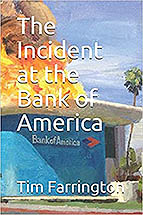 That’s the experience of futility, which is at the heart of depression. But in the general population, depression is not the result of a spiritual discipline. So the question arises, how do we distinguish between depression as a dark night of the soul, and depression as a treatable psychological disorder?
That’s the experience of futility, which is at the heart of depression. But in the general population, depression is not the result of a spiritual discipline. So the question arises, how do we distinguish between depression as a dark night of the soul, and depression as a treatable psychological disorder?
FARRINGTON: Well, a lot of what happens in the dark night of the soul is the same as what happens in clinical depression. There’s a sense of complete helplessness and futility, and a tremendous anxiety about being unable to pull yourself out of that state. There’s a sense that you can’t do anything to make yourself better.
My mother was manic-depressive all her life, and she was also a borderline personality, meaning that her sense of self, identity, and behavior were frequently unstable. Is the person in a dark night of the soul similarly unstable?
FARRINGTON: Again, most of the people John was addressing were monastics in a stable, communal religious life. Most unstable personalities were probably weeded out by the filters of monasticism, as it were. John does address what we would now call mania, in terms of visions and hearing voices, and he’s very tough on all that. You get the sense that he was dealing with a lot of people having ego-oriented visionary experiences, spiritual manias of swooning, seeing spirits, making proclamations, and so on. John said that none of that had much to do with God. Zen training is hell on that stuff too; you’re instructed to just let it all go.
John also addressed what he called bad humors or melancholy, which is probably what we would identify as clinical depression. He helps readers make distinctions between bad humors and the genuine dark night, one of them being susceptibility to distraction. For instance, if you can find something to do that makes you feel better, then you’re not having a genuine dark night; you just have a weak spiritual practice.
For someone who’s depressed, some kind of distraction would be part of the modern prescription: find a way to lighten up! But if it’s impossible to lighten up, that doesn’t necessarily mean you’re having a priceless spiritual experience.
FARRINGTON: Which is exactly why all this stuff is so interesting to me. In a sense, I’ve experienced the path of depression just as exhaustively as I’ve experienced the contemplative path to God. To me, exactly what I’m going through has always been an issue: Should I be treated for suffering from depression, or am I passing through the dark night of the soul and should tough it out? John did say that bad humors should be treated; they had herbs for that. In a modern context, I use anti-depressants.
So if you treat your melancholy, can you still be in the dark night? Isn’t it melancholy that makes it dark?
FARRINGTON: No, what makes it dark is the genuine realization of helplessness. The melancholia is an emotional reaction to that insight, but the insight itself doesn’t have to be depressing. Yet there’s a paradox here, because the depressed person sees suffering everywhere, and the Buddha’s first noble truth is that “life is suffering.” That insight may well be the fruit of your dark night of the soul, that suffering is everywhere and you’re relatively helpless to do much about it. So the question is, how do you react to that realization? Can you see suffering everywhere yet not become depressed by it?
This question can become sort of politicized. People coming from a perspective of spiritual discipline may think that if there’s any depression or other mental disorder associated with their spirituality, then their spirituality is invalidated. From the clinical side, people may think it’s criminally negligent to let people suffer and call it a spiritual experience. Peter Kramer makes a strong case that there is no usefulness in depression whatsoever, that it’s neither spiritually nor artistically rewarding in any sense, and should always be treated.
Well, that does bring up the comparison with fasting again. If you’re purging toxins and feeling awful for a while, you can remind yourself that you’re purging and it’s good for you. But the quicker way to “treat” the symptoms of a fast and feel better soon is to eat something. In depression, it can be dangerous to think “This is good for me so I’ll suffer more until I’m spiritually purged.”
FARRINGTON: Right, you can just be reinforcing the neural routes of suffering that are already active in your brain, from the clinical point of view.
But if you distract yourself in order to feel better, might you be short-circuiting a process of spiritual cleansing?
FARRINGTON: I don’t think so. Again, John says that if it’s possible to distract yourself, you’re not having the genuine spiritual experience of a dark night anyway. So if you want to feel better and can find any way to do it, that’s what you should do.
The question really is: What are you ripe for? Renunciation is not an act of will, it’s an instinctive act that follows a certain kind of powerful insight. You’re propelled into a cloud of unknowing that you are willing and ready to deal with, and you don’t actually want to “lighten up.” At that point, it’s not a teeth-grinding discipline to renounce having fun and getting back to your normal life. You see that what you’re going through has a useful meaning. When it ceases to have a useful meaning, then you can go and have fun again. After many years of the most intense asceticism, the Buddha drank a glass of milk, and that was key to his enlightenment. That was the origin of the middle way, because he realized that the asceticism he had been pursuing was not the final answer to everything.
That reminds me of seeing a Franciscan monk in a coffeehouse years ago, wearing the full ascetic uniform of the burlap robe, rope belt, and sandals, and ordering a Caffe Fantasia -- a rich coffee drink with chocolate and whipped cream and candy sprinkles. He looked like the happiest guy on the planet!
FARRINGTON: In the traditional monastic context, the distraction from the dark night would not be what most of us call fun; it would be some spiritual reading, or happy chanting. But when you can’t even pray anymore because your prayer has dried up, then you’re just supposed to wait patiently for God, in all your emptiness and nothingness. I’d much rather have a spiritual life that includes the Caffe Fantasia, even if I’m in a dark night. There’s some truth in what T.S. Eliot called “people distracted from distraction by distraction,” but I think there’s also the simple pleasures of life that we all deserve. In fact, those pleasures can be as good as it gets on this planet.
Isn’t the dark night of the soul an exceptional experience, that happens only once in a while in the course of a spiritual discipline, whereas what we commonly call depression is a chronic mood disorder?
FARRINGTON: Yes, but the question is how does the person in the midst of either experience honestly sort out what is happening? If you pursue any spiritual path far enough, you will have a crisis of some sort, involving the letting-go of naive notions of what you’ve been doing spiritually. If you’ve got a feedback loop in your brain for depression, then your spirituality will depress you just like the conditions of your everyday life depress you. No matter how we define any of this stuff, it’s very important to deal with depression properly. And treating depression effectively will never be, in any way, detrimental to a spiritual practice. It won’t pull the plug on your dark night, so to speak. Kramer is right on when he warns against “the myth of heroic melancholy”; there’s no question that I got into that big-time when I was younger. I thought it was a profound thing to be depressed about the world, because it was so obviously fucked-up.
On the other hand, you can go too far to the other side and become afraid to find anything positive in suffering. Yes, heroic suffering can become absurd, but it’s also absurd never to allow a moment of moodiness to creep into your experience.
That brings up the question of New Age spirituality, which you’re certainly familiar with, that tells us God only wants us to be happy and that suffering is pointless. The problem with that ascendant perspective is, of course, denial. People start ignoring or denying their dark feelings because they’re relentlessly focused on “the Light.”
FARRINGTON: If Freud taught us anything, it’s that when you scratch the surface of the psyche, you uncover a lot of complexity. We have a lot of historically determined patterns of thinking and feeling that do not go away by simply deciding to be happy. Those patterns only go away or change, even a little, by the disciplined cultivation of other patterns of thinking and feeling. But I don’t even see that much contradiction between the notions of perfect happiness and the dark night of the soul. Thomas Aquinas says that our goal as human beings is happiness, and we will find our greatest happiness in the contemplation of God. Aristotle said pretty much the same thing, that we’re born to be happy and we find happiness only in devotion to the highest ideals.
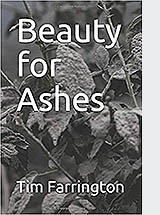 Similarly, a lesson from A Course in Miracles teaches that “God’s will for me is perfect happiness.” Of course, there’s a little catch: in ACIM as in other mystical paths, the cost of this perfect happiness is total surrender of the ego. And elsewhere the Course suggests that such surrender takes, at the least, thousands of years.
Similarly, a lesson from A Course in Miracles teaches that “God’s will for me is perfect happiness.” Of course, there’s a little catch: in ACIM as in other mystical paths, the cost of this perfect happiness is total surrender of the ego. And elsewhere the Course suggests that such surrender takes, at the least, thousands of years.
FARRINGTON: Exactly! “Oh yes, by the way. . .” Buddhism says that the perfect bliss of enlightenment is entirely possible, but how often does it happen? Well, there are two rings floating in a giant ocean, and two turtles who surface somewhere in that that ocean once every ten thousand years. As often as one of those turtles happens to surface with his head inside one of those rings, that’s how often someone gets enlightened. Or there’s a bird flying over the highest mountain in the world with a silk handkerchief, and it brushes the top of the mountain once every thousand years. When the mountain has been eroded flat by the brush of that silk handkerchief, then you’ll be enlightened. This is a pretty deliberate pace! All these paths would seem to be encouraging us not to be too ambitious about achieving bliss. Now that’s depressing, isn’t it?
Well then, let’s talk more about creativity. Many famous writers and artists have suffered from depression. Is there a connection between depression and creativity? Do periods of depression often precede or overlap productive periods for an artist?
FARRINGTON: I know that both statistical studies and popular belief point to a higher incidence of mental illness in creative types, but I suspect that artists are probably no more prone to psychological disruption than anyone else. For them, I think it just shows up more vividly. An artist’s loss of psychic balance is immediately debilitating to her work. If you lose your balance on a high-wire, you fall, and people notice. If you lose your balance at ground level, you may stumble or reel, but you can keep moving for a longer period, however awkwardly. By the time you fall down while just trying to walk, everyone around you knows you have a problem. But you may have been staggering for years before that.
So I think the idea that creative people are more prone to depression may be illusory, because there could be a matching amount of unreported, undiagnosed psychic misery in the general population. I wouldn’t be surprised if a more realistic and discerning set of criteria showed that creatively engaged people are psychologically healthier, on the whole.
That said, there is no question in my own mind that periods of depression are often associated with productive periods artistically. The essence of breakthroughs in creative work usually comes from a sense of the tried-and-true approaches failing. We are looking for a new angle because the old angles aren’t working, and so there is the scariness of moving into not-knowing-what-to-do, of going beyond previous solutions. Creativity often flourishes in a state of uncertainty that approaches desperation, a heightened state of psychic pressure and urgency. There is a sense of helplessness in that state as well, a sharp awareness of needing something that you don’t have.
The breakdown of certainties is a very rich ground for breeding depression; there is inevitably a lot of fear associated with recognizing an impasse. It comes with the territory: to learn what we don‘t know, we have to go through a place of not-knowing. A lot of the creative process requires cultivating the virtues that can see you through these periods of cluelessness and uncertainty: patience, faith, humility, trust in a larger coherence, and plain old courage. But during creative cluelessness, you are definitely more vulnerable to the ravages of despair, the temptation to give up, and all the self-abuse that comes with experiencing failure and inadequacy.
I used to say that my best creative state was a “working depression.” What I meant by that was that I wasn’t so depressed as to be nonfunctioning, but I was distinctly down. Nowadays I’m more inclined to say that depression itself doesn’t help me write at all. I think I’ve come some distance in learning to de-glamorize depressive emotions for myself. I’ve also learned to deepen my faith, and to distinguish between true spiritual surrender and just “giving up” on myself. While I used to think that I had to be somewhat depressed to write, the truth is that I have to be somewhat surrendered to write -- and there is an important difference in those states. When I was younger I tended to achieve surrender only in the middle of depressive episodes. What’s clearer to me now is that depression is largely the ego’s reaction to surrender. Because surrender itself is not only painless, but blissful. You feel like you can take a breath for the first time in ten thousand years.
Even if you’re not writing while depressed, is there any way in which the content of depression -- the images, ideas, or feelings that you have experienced in that state -- specifically inform your work when you are writing?
FARRINGTON: Depression is like any other debilitating illness, and you can learn from your own acceptance of any illness. You can learn humility and patience from dealing with it; you can experience gratitude when it lifts, as you would from the easing of any other illness. There are the times when the clouds part and you see the sunlight, or a kid eating an ice cream cone, and perhaps you’re more grateful for that than if you weren’t previously depressed. You become more appreciative of the small gifts of life. Whenever you can get out of the little hole of yourself, you’re more sensitized to others’ suffering, and more aware of the complexity of the causes of suffering. So your capacity for compassion is enhanced.
In your experiences with spiritual discipline, therapy, legal and illegal drugs, what has provided the most fruitful route through depression?
FARRINGTON: It’s pretty simple, really: eating right, getting enough exercise, not drinking too much. For me, a minimal dose of anti-depressants seems necessary; if I go off them I go down.
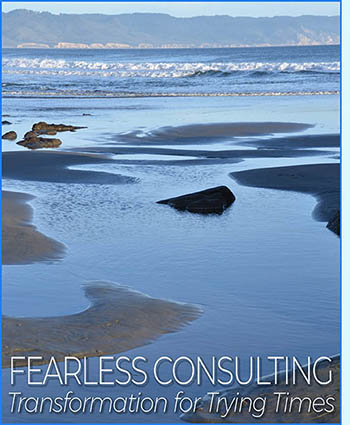 The diagnosis of bipolar disorder, which used to be called manic-depressive disorder, is very much in vogue now and there’s increasing controversy over whether it’s always being applied correctly, particularly with children. After all, everyone experiences mood swings to some degree. How do you know when you’re manic, for instance?
The diagnosis of bipolar disorder, which used to be called manic-depressive disorder, is very much in vogue now and there’s increasing controversy over whether it’s always being applied correctly, particularly with children. After all, everyone experiences mood swings to some degree. How do you know when you’re manic, for instance?
FARRINGTON: The police are taking each of my arms and leading me away! There’s no question that the tolerance of your social environment is sometimes the crucial factor in diagnosis. But I have been just nuts sometimes, and people will notice that. The paradoxical thing is that mania can feel divinely inspired. Every impulse, whim, or megalomaniacal thought can seem like the will of God. Through years of reflection and processing, I’ve come to recognize mania as an energized fantasy. I could go for days without sleeping, and it seemed like everything I was doing was so right. But it was just the ego-self blown large, and taking fantasy as reality. Then, when you come down you’re so ashamed of what you did while manic that it makes your depression a hundred times worse. And coming from the other direction, if you’ve been depressed for a while and your mood starts to lighten, you’re so happy that it’s easy to ride right into your next fantasy high.
Fortunately, the drugs for manic depression have gotten so much better than they used to be. In the 50s people were put on barbiturates; in the 60s they started prescribing lithium, which wasn’t a lot better. Lithium just made me feel gray and distant from myself. Kay Redfield Jamison, who has written beautifully about depression, has noted that the drugs are good enough now that you can live with depression reasonably well.
I should also note that I wasn’t particularly creative during my manias. I felt like I was, but I didn’t do very good work. That’s why I used to say that I did my best writing in a working depression; now I would just call it sobriety, I guess. Most of my best work has come slowly, quietly, and with a lot of self-doubt, but not full-blown depression. Writing is always a slow climb; it’s a disciplined labor, and it seldom feels like I’m being swept along, as a mania would make me feel.
In a recent Authors Guild bulletin there was a quote from the correspondence of Jonathan Franzen and David Foster Wallace, suggesting that “writing is a way out of loneliness.” Of course, Wallace committed suicide. And most writers find their vocation to be an intensely solitary endeavor. How is it for you? Does writing intensify or ultimately ease loneliness?
FARRINGTON: Done right, I think the discipline of writing makes your heart more open and soft. Or at least it helps you take your head out of your ass. You’re a lot better able to relate to people when you’ve gotten your head out of there. That is, writing should ultimately decrease morbid self-absorption, not make it worse.
It’s a constant struggle for me to be a decent human being. If my writing is going badly, then the struggle is even more intense. The fundamental urge is to go ever deeper into solitude until something gives; on the way down, there is an absorption in the work that might be called creative preoccupation. But when the work is going well, I would say that I’m less lonely because I’m humble, patient, and not fighting anything. In that sense writing connects me to reality. The Desert Fathers in the early Christian tradition said, “Get thee to thy cell, and thy cell will teach thee everything.” So writing has been my cell that has taught me everything.
______________________
Fearless Literary Services
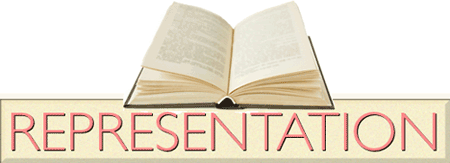
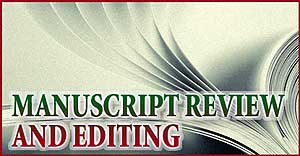
 HOME • BOOKS • FEATURES • STAY IN TOUCH
HOME • BOOKS • FEATURES • STAY IN TOUCH